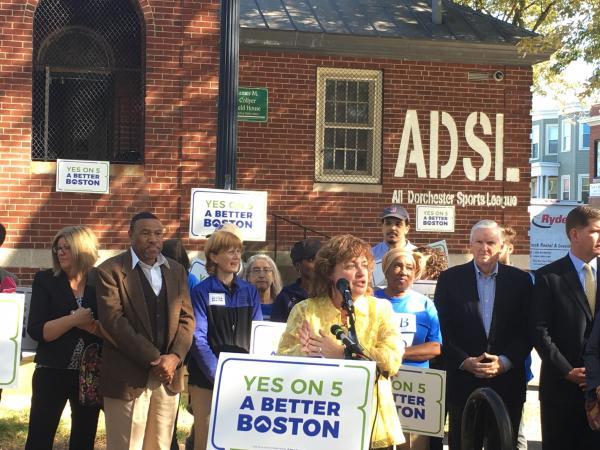October 13, 2016

ADSL director Candice Gartley talked about the potential benefits of the Community Preservation Act during a rally in favor of Question 5 held last Thursday at Town Field in Fields Corner. Jennifer Smith photo
The small rectangular brick building housing the All Dorchester Sports League (ADSL) is slowly but surely caving to the ravages of time and the elements. With no hot water, a fragile heating system supplemented by unreliable space heaters, broken windows, leaking pipes, and damage from water seeping through its degraded walls, the structure has for more than 30 years served as the home base for thousands of adults and children availing themselves of the ADSL’s recreational programs.
It offers a prime example, says its executive director, Candice Gartley, of how the property tax surcharge for community preservation being weighed as a Boston-only ballot question can be applied in the neighborhoods.
Mayor Martin Walsh and other advocates for the Community Preservation Act (CPA) last week touted the benefits of the one-percent surcharge fund for increasing the city’s affordable housing stock, restoring historic buildings, and improving open space. They all stood before the ADSL building at Town Field on a crisp Thursday morning to drum up support for a “yes”on Question 5 on next month’s ballot.
“This building is really worn out,” Gartley said at the rally. “It could use some help… We are the poster child for how the funds would benefit community organizations just like ADSL, so you can imagine how hopeful we are that the Community Preservation Act is voted in.“
The CPA has been adopted by more than 160 cities and towns, with surcharge rates ranging from one to three percent. If the measure is adopted and goes into effect in 2017, Boston is expected to take in some $20 million annually in direct revenue and matching funds from the statewide CPA pool.
Growth pressures in Boston are beyond the city’s capacity to fully address as it stands, said Mayor Walsh. “When you think about what we’re trying to do,” he said, “we’re trying to create opportunities for more money into housing, and more money into parks, and trying to do a lot of things.”
He added, “We just can’t get ahead. Our city’s growing fast. We have a lot of families in our city that are being priced out. We have a lot of low-income families in our city that can’t find a place to live and we have a lot of moderate income families in our city that are paying high-end pricing to live in the city of Boston. And when you have a city like that, that’s not good for everyone across the board, that’s a problem.”
City Councillors Annissa Essaibi-George and Tito Jackson also attended the rally, having voted along with 10 of their colleagues to have the CPA placed on the ballot. Councillors Michael Flaherty and Andrea Campbell sponsored the measure earlier this year.
According to advocates, the average Boston resident would pay $24 through the CPA (an online calculator can provide estimates of CPA tax rates by parcel) although some neighborhoods would see that amount tilt lower or higher. Chief among the concerns raised by residents is the impact of any tax increase, and, beyond that, why the burden seems once again to be placed on taxpayers.
The city first voted down the CPA in 2001 when a two-percent surcharge was in the mix. A skeptical Mayor Menino administration and pressure from the business community contributed to the measure being defeated, with 40,162 “no” votes and 30,246 saying “yes.”
But, advocates say, this time around they have businesses on their side and a compelling case for the directed funds. Unlike existing property taxes, which make up 68 percent of Boston’s revenue and are funneled into the city’s overall budget, revenue generated by the surcharge and state matching funds can only be used for approved projects in the areas of housing, open space, and historic preservation.
Topics:


